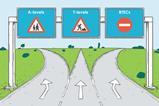Chemistry students need a new set of skills to impress employers – from report writing to presenting, and digital know-how to critical thinking

First, the good news: the world wants more chemists. But the kind of chemists needed by employers is changing. The RSC’s Future Workforce and Educational Pathways project, conducted in 2023, reveals that while educational qualifications still count, employers are looking for good communicators who can think critically and work as part of a team. Alongside these transferable skills, employers also want green skills which lessen human impact on the environment and digital skills.
These findings chime with the experience of graduate scientist, Annabelle Nicholson, who notices a big difference in the type of graduates her company is recruiting. ‘The biggest problem to solve is poor communication. The company has mostly hired people who are change-makers, who are confident and voice things … while also being strong in maths and data skills.’
‘You’ll be pushed to find a year 11 student in any school that can use Excel when they leave’
First, the good news: the world wants more chemists. But the kind of chemists needed by employers is changing. The RSC’s Future Workforce and Educational Pathways project, conducted in 2023, reveals that while educational qualifications still count, employers are looking for good communicators who can think critically and work as part of a team (rsc.li/41ljLZ1). Alongside these transferable skills, employers also want green skills which lessen human impact on the environment and digital skills.
These findings chime with the experience of graduate scientist, Annabelle Nicholson, who notices a big difference in the type of graduates her company is recruiting. ‘The biggest problem to solve is poor communication. The company has mostly hired people who are change-makers, who are confident and voice things … while also being strong in maths and data skills.’
‘You’ll be pushed to find a year 11 student in any school that can use Excel when they leave’
Inventor Rory Back suggests that making a presentation to teachers and peers should be an element of coursework. ‘For a chemist, we don’t want a person just routinely performing tasks and filing reports … but, rather, someone who can present the data, form a plan, make a case to senior management.’ He observes that the later students get experience of public speaking and presenting their work, the more difficult it becomes.
Curriculum shake-up
‘Some of those transferable skills are not something that students are going to grasp easily. They really are going to have to be built on,’ says head of science, Liz Stacy. Her school is looking at how to introduce more report writing, presentations and poster development, followed by oral examination of those aspects to provide opportunities for students who are less confident with written exams to demonstrate their skills.
‘Some of those transferable skills are not something that students are going to grasp easily. They really are going to have to be built on,’ says head of science, Liz Stacy. Her school is looking at how to introduce more report writing, presentations and poster development, followed by oral examination of those aspects to provide opportunities for students who are less confident with written exams to demonstrate their skills.
That means rethinking assessment, believes Charles Gill – a biology specialist teaching chemistry this year. ‘There’s nothing specifically in the curriculum that insists on the ability to communicate, to collaborate.’ Until exam boards and Ofsted find ways of assessing those transferable skills, which are not chemistry specific, ‘there’s no real hard pressure to change,’ he says.
It would be valuable to raise awareness of sustainability in the curriculum and provide context for specialist skills
Digital skills are another big gap, adds Liz. ‘You’ll be pushed to find a year 11 student in any school that can use Excel when they leave,’ she says, adding that many teachers don’t know how to use it properly either. Getting a student to build a spreadsheet, analyse the data and report on the findings – and knowing that that will be a means of assessing digital literacy – would also help focus CPD so that it’s more meaningful.
Students need to know how to write a lab report, and that should be a feature in any experiment-based topic, says researcher turned chemistry teacher, Brotati Veraitch. ‘At A-level, where they have a bit more time, whenever there is a database, I try to work through that with my students, and they benefit a lot, whichever field they go into.’
Critical thinking skills are harder to teach, suggests Rory. ‘If the way you learn is mostly through textbooks and exams, it’s not an ideal way to explore critical thinking. That comes through teamwork, experiment planning and project-type work rather than traditional learning.’
Critical thinking skills are harder to teach, suggests Rory. ‘If the way you learn is mostly through textbooks and exams, it’s not an ideal way to explore critical thinking. That comes through teamwork, experiment planning and project-type work rather than traditional learning.’
Go green
Green chemistry
And fitting in green skills? Rory thinks it would be valuable to raise awareness of sustainability in the curriculum and provide context for the specialist skills that come later. Annabelle suggests a practical where an extra question focuses on the optimum amount of material needed to make something and to quantify the carbon saved by avoiding waste. She believes that introducing the idea you can use data to predict something and why that prediction might be beneficial (to save resources, for example) to learners would be invaluable.
Teaching hydrocarbons provides an opportunity to discuss sustainability, notes Charles, and with it a chance to do presentations on the petrochemical industry. But fitting it into the curriculum is a challenge. Something has to give.
And fitting in green skills? Rory thinks it would be valuable to provide context for the specialist skills and raise awareness of sustainability in the curriculum, such as linking the UN’s sustainable development goals to chemistry topics (rsc.li/3OIVGnG). Annabelle suggests a practical where an extra question focuses on the optimum amount of material needed to make something and to quantify the carbon saved by avoiding waste. She believes that introducing the idea you can use data to predict something and why that prediction might be beneficial (to save resources, for example) to learners would be invaluable.
Teaching hydrocarbons provides an opportunity to discuss sustainability, notes Charles, and with it a chance to do presentations on the petrochemical industry. But fitting it into the curriculum is a challenge. Something has to give.
‘Chemistry is one of those subjects where you can remove quite a lot of content without impacting students who want to go on to study A-level. In fact, we’d be giving them really beneficial skills which would help them progress and do a better job at A-level and beyond,’ says Liz.
She identifies topics that are ‘dumbed down’ at GCSE and re-taught at A-level, such as electron configuration (14–16 and 16–18 models) and pH. ‘I’m not saying we don’t teach pH. It’s important but is it important for pupils to know the solubility rules off by heart of all of the common salts? Probably not.’ Brotati points to a GCSE topic on using resources that could go, or weeding out subjects repeated across triple science, such as the Earth’s atmosphere, that could make space for presentation or data skills.
She identifies topics that are ‘dumbed down’ at GCSE and re-taught at A-level, such as electron configuration and pH. ‘I’m not saying we don’t teach pH. It’s important but is it important for pupils to know the solubility rules off by heart of all of the common salts? Probably not.’ Brotati points to a GCSE topic on using resources that could go, or weeding out subjects repeated across triple science, such as the Earth’s atmosphere, that could make space for presentation or data skills.
Rethinking how and what schools teach to better equip students for work in tomorrow’s chemical industry looks like being a big project for employers and schools to solve together.
Angeli Mehta is a freelance science writer, with a research PhD
Find ideas articles and resources on Teaching science skills on the Education in Chemistry website: rsc.li/49wBS0s














No comments yet